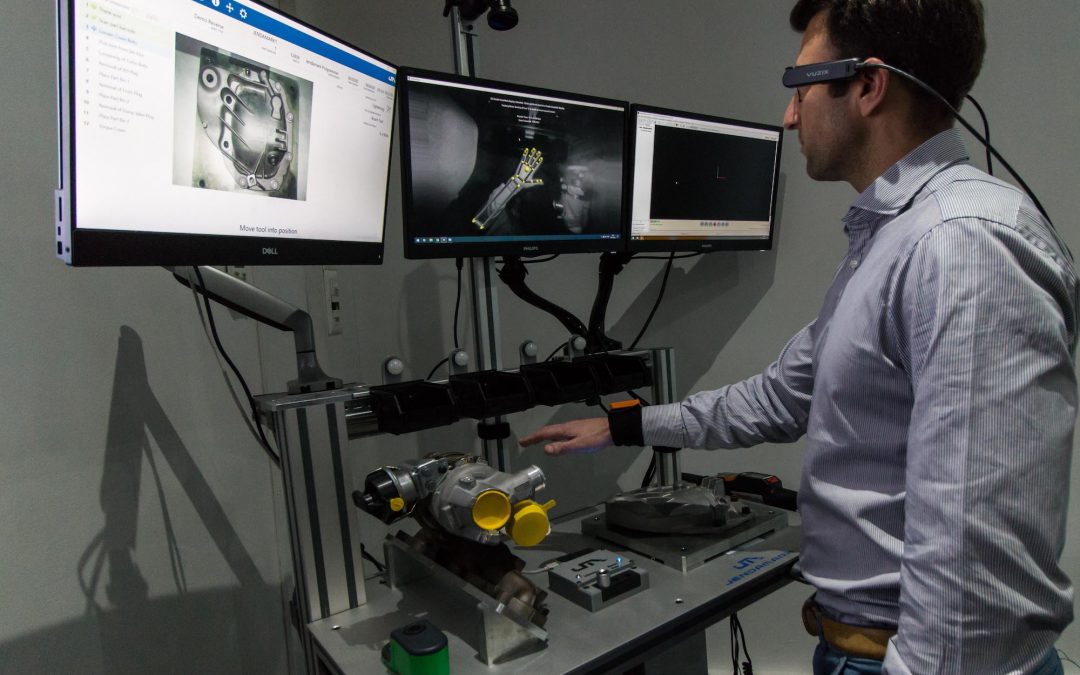
by Good News Lab | Jan 14, 2020 | Industry 4.0, Jendamark Junction, Jendamark News
Jendamark South Africa’s new tech centre is an exciting space for collaborating with customers and forging new paths on the digital transformation journey.
“As the ecosystem of digital products and services grows, we can now showcase the different offerings, as well as our partners’ technologies, while finding new ways of solving some of the toughest challenges on the production line,” says Jendamark’s manager for digital strategy and transformation, Juane Schutte.
“We have defined Industry 4.0 not as a bunch of technologies, but as a new way of collaborating in an ecosystem that works together seamlessly to provide value to our stakeholders and customers,” says Schutte.
Some of the technologies that customers can look forward to experiencing first-hand include the:
- Odin data platform – WorkStation (operator guidance system), LineWatch (real-time production dashboard) and mobile apps (end-of-line quality inspection).
- Integrated hardware – Odin smart watch, wireless bolting tools, augmented reality glasses, infrared sensors for hand and tool tracking, scanners and cameras.
- Virtual reality
– production line simulation to ensure design optimisation;
– operator training using digital worker guidance;
– development and simulation by gaming developers.
- 3D printing – printing parts for testing, new part development and prototyping.
Schutte says the tech centre also includes a giant screen for demonstrating the various capabilities to visiting groups and customers.
“It is exciting to be able to show the many practical applications for digital technologies throughout an organisation. We can help customers to improve efficiencies for operators, HR personnel, production
managers, process engineers, data scientists and more.”
So far, Jendamark has hosted visitors from all strata, including students, CEOs and government officials.
“Everyone who enters the room gains a practical understanding of how Industry 4.0 is impacting manufacturing and the future of work,” explains Schutte.
“The feedback has been phenomenal. We think this is because real collaboration has been missing between businesses and stakeholders. We find that, after visiting our tech centre, our potential customers want to bring their own children to learn and open their eyes to the ways in which the future of work will be impacted.
“We look forward to not only showcasing our tech, but also enabling eager learners to get involved and build new solutions together. Technology should not be a stumbling block but rather a great enabler for future growth.”
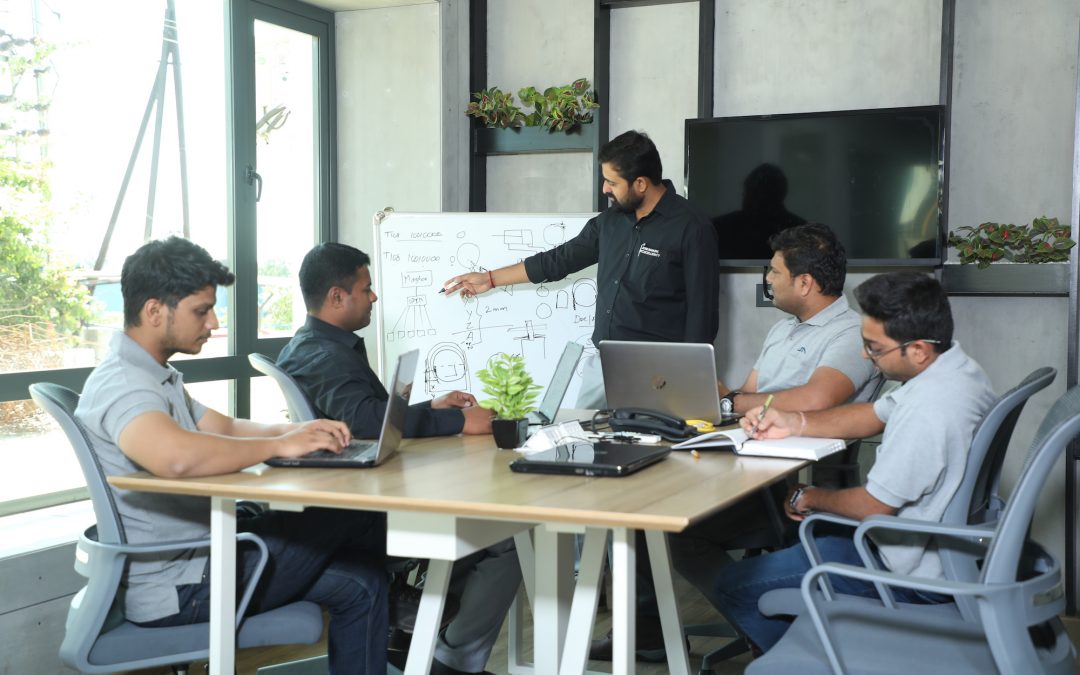
by Good News Lab | Jan 14, 2020 | Industry 4.0, Jendamark Junction, Jendamark News
Making the move from machine builder to technology company has been a natural progression for the newly rebranded Jendamark India – and one that will have huge implications for its global customers.
That’s the message from Himanshu Jadhav, who has taken the helm as chief executive offi cer and director of the new-look entity, previously known as Jendamark Techcellency.
By aligning more closely with Jendamark’s international head office in South Africa, Jadhav says, Jendamark India will be able to bring the latest solutions and technological advancements to its Asian customers.
“We are looking to move towards value creation for our customers by bringing new systems, new innovations and something new which does not exist in the current market.
“Previously, India was focused only on manufacturing. With access to this broader global offering, operating with the same vision and focus as Jendamark SA just makes much more sense.
“With this restructuring, we have re-aligned our business to focus more on automation and Industry 4.0-driven digital technology.”
Jadhav makes it clear that the Pune and Port Elizabeth plants will continue to operate in a unified manner, combining their strengths to deliver turnkey assembly facilities, but that Jendamark India’s particular understanding of the local manufacturing sector will allow it to make a unique contribution on the subcontinent.
“We will introduce our special blend and way of doing things, and gradually take more responsibility in shared customer projects. There is a lot to share and learn between the companies,” he says.
As far as the implications for customers are concerned, Jadhav says he believes they will be the biggest
beneficiaries of this positive development.
“There will be investments made in the near future in specific areas for technological advancements.
Knowledge transfer will be smoother, with our research and development team working on specific solutions needed by Indian customers,” he says.
Jendamark Automation’s operations director Siegfried Lokotsch remains in his role as chairman of the board of Jendamark India.
“The Jendamark name has always represented the highest standards in automation technology and service to the global automotive industry. We are proud of the tremendous strides Jendamark India has made since the start of our association five years ago and we are excited to continue growing in service of the booming Indian manufacturing sector,” adds Lokotsch.
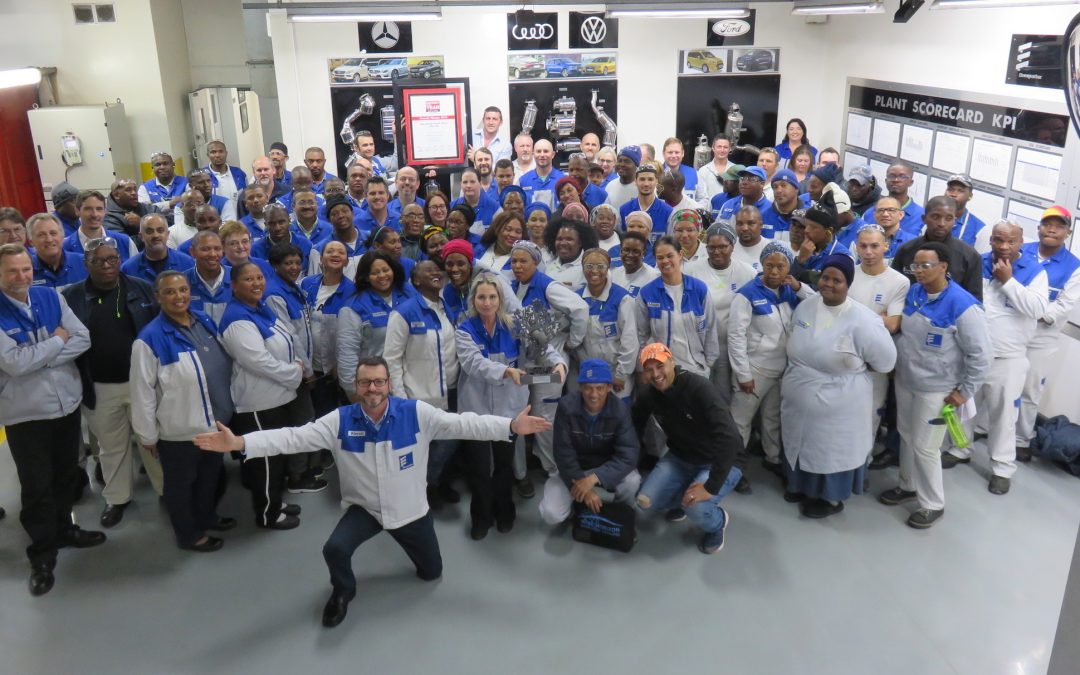
by Good News Lab | Jan 13, 2020 | Jendamark Junction, Jendamark News
Jendamark is proud to be associated with long-standing customer Eberspächer
South Africa, which recently became SA’s first recipient of the Factory of the Year award.
As a supplier to the major original equipment manufacturers (OEMs) globally, Eberspächer has become synonymous with the manufacture and assembly of catalytic converters, diesel and petrol particulate filters, mufflers, pipes and cold-end exhaust systems.
This reputation for quality was cemented this year, when the company received the inaugural South African award, which forms part of the highly prized international Factory of the Year initiative.
According to Eberspächer SA managing director Kieron Jordaan, the company was ranked in the second quintile of the global competition, having demonstrated above-average performance across the customer satisfaction, economics and quality categories.
“We also showed strong performance within the top quintile of the global competition across several benchmarks, including maintenance costs, employee productivity improvements, energy cost ratio, delivery improvements, reductions in external failure costs, and total cost of quality.”
Jordaan says the win is significant, especially in the demanding, fast-paced world created by the fourth industrial revolution.
GLOBALLY COMPETITIVE
“The automotive sector is highly competitive – this proves that we are able to produce a quality product while maintaining our costs, and motivating and
improving our workforce.
“It proves that South African firms are capable of competing against first-world companies, which is significant considering the ever-increasing demands and challenges facing not only our sector, but the country as a whole,” he says.
Over the years, Jendamark has helped Eberspächer SA with a number of solutions designed to improve efficiencies in the factory, including hard-stuffing equipment, adaptive canning lines and full assembly lines. This has been backed up by machine improvements and upgrades as well as service and maintenance support.
The relationship started back in 2011 with an upgrade to a press for the Volkswagen PQ35 project and has grown significantly since then, as tougher global emission regulations have radically altered the requirements for catalytic converter assembly facilities.
Outlining the changes, Jordaan says early products involved manual assembly stations with manual wrapping of the mat and ceramic monolith within halfshell stampings.
“Changes to the holding mat technologies, multiple variant requirements, tighter tolerances for our product as well as vehicle engine space, and a much greater emphasis on traceability and GBD, have necessitated far more sophisticated processes and equipment.
“Enter Jendamark,” he smiles.
MAJOR PROJECTS
Jendamark has gone on to build and assemble various complex pieces of equipment for some of Eberspächer SA’s major projects, as well as assisting with the upgrading of several machines since those earlier days.
“In addition, there is close co-operation on project management and technical aspects including process integration,” says Jordaan, adding that the Jendamark team’s technical expertise and support on call has made the company a trusted local supplier.
The most recently completed project was an adaptive canning line for the Ford DV-Neo programme, which is a diesel particulate filter intended for multiple vehicle assembly plants in Europe.
Developed and built by Jendamark, the line assembles the ceramic filter, support mat and stainless steel tube such that each part is unique in terms of identification, holding force and Gap Bulk Density (GBD).
And, says Jordaan, Jendamark is busy with the final assembly line for the Volkswagen MAR-Evo programme that has the start of production in 2020.
“The line has multiple stations to enable assembly of hang-on parts, leak testing, laser marking and measurement for a diesel particulate filter for a Volkswagen platform.”
Whatever the requirements, Jendamark has stepped up and responded to each project with consistent service and a desire to keep Eberspächer SA serving its customers to the best of its award-winning ability.

by Good News Lab | Jul 9, 2019 | Jendamark Junction
Jendamark Techcellency’s newly launched adaptive canning facilities in India put it in a unique position to help vehicle manufacturers and Tier 1 suppliers meet the demanding BS-6 emission norms by the deadline of April 1 next year.
As a signatory to the Paris Climate Agreement of 2015, the Indian government has pledged to move directly from Bharat Stage (BS) Four to Six, implementing norms for a cleaner, greener country, which are on par with the stringent Euro Six standards.
For original equipment manufacturers (OEMs), this means that all new vehicles must be fitted with specialised equipment to drastically reduce harmful emissions, such as nitrogen oxide and hydrocarbon gases. Emission regulations set the legal limits on how much of these gases may be emitted by a petrol or diesel vehicle per kilometre travelled.
Outlining the need for change, Jendamark Techcellency CEO Himanshu Jadhav says that India is, at present, one of the most polluted countries in the world.
“Jendamark is the only supplier in India which has its own design and manufacturing facility for making adaptive canning lines which meet the emission norms.
“Our headquarters in South Africa “Our headquarters in South Africa has been providing canning lines to companies across the globe for more than 10 years. We have been able to draw on this vast experience, expertise and fine tuning of the machining to develop unique Indian solutions,” says Jadhav.
“With the help of Jendamark SA, which provided design training, we started making canning lines as per customer requirements in India to meet stringent emission norms.”
In the case of passenger vehicles, expensive high-grade catalytic converters will be used mostly, with the high cost offset by low running costs and less maintenance.
Commercial diesel vehicles, on the other hand, present more of a challenge. Treatment systems in commercial vehicles are a combination of a Diesel Oxidation Catalyst, Diesel Particulate Filter and Selective Catalytic Reduction to break down harmful emissions into less harmful ones.
“Jendamark is also working very closely with Tier 1 suppliers like Faurecia, Sharda Motors and Cummins to ensure that the OEMs are able to meet their objective of making vehicles BS6-compliant from April 1 next year,” says Jadhav.
In India, Ashok Leyland, Tata Motors, Force Motors, and Mahindra & Mahindra provide 90% of commercial vehicles. All these companies will receive catalytic converters or assembled after-treatment systems from Jendamark machines. He says Jendamark shares the expertise and experience gained on adaptive canning lines with the research and development team of Tier 1 suppliers to ensure that the product is developed to suit the product and process requirements.
“With Jendamark’s in-house manufacturing expertise and strict process controls, we are able to deliver all the equipment and machines as per the timelines set by the customers, and work towards the vision of a clean, green India.”
IMAGE: @snehit/123RF
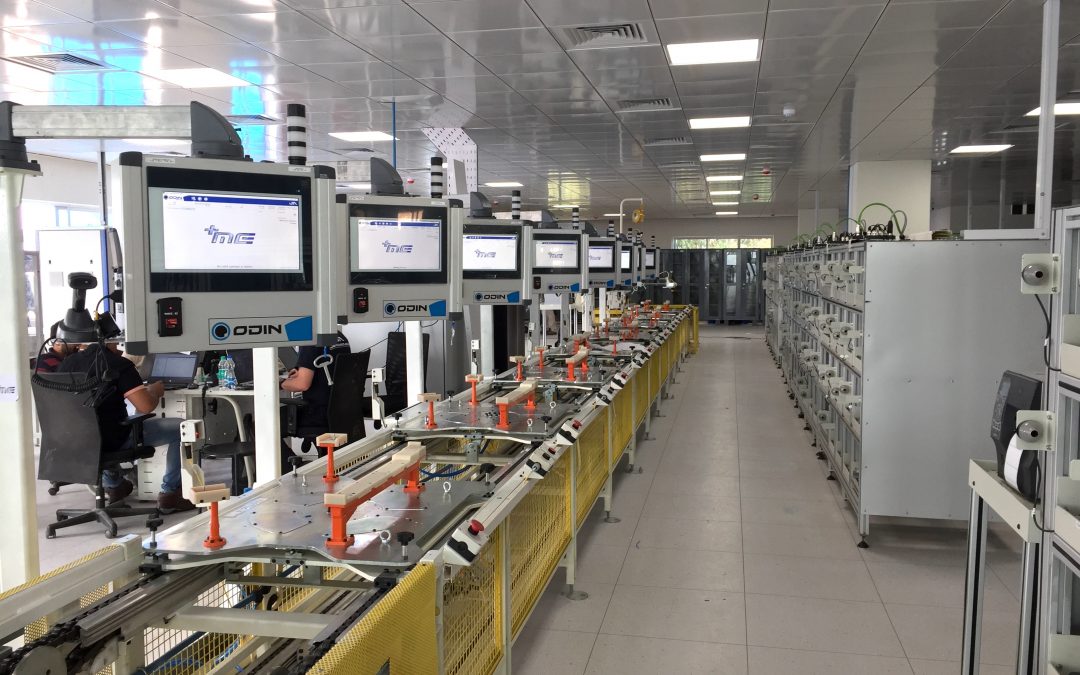
by Good News Lab | Jun 13, 2019 | Jendamark Junction
A pioneering partnership with Mahindra Electric (MEML) has seen Jendamark delivering India’s first automated assembly line for the power electronics that drive the brand’s electric vehicles.
Jendamark has proved a reliable partner in supporting MEML’s goals by delivering state-of-the-art, Industry 4.0-enabled assembly lines and solutions to their world-class facility in Bangalore. Entering the innovative and exciting world of electric vehicles, Jendamark Techcellency (JMKT) has developed a strong partnership with Mahindra, the country’s front runner and pioneer in the field.
“We believe that change is constant. Although the electric car infrastructure in India is still developing, most companies have strategies in place and are investing in the electric car market,” says Jendamark Techcellency CEO Himanshu Jadhav.
“At Jendamark, we are continuously looking for challenges. In fact, normal is boring at our company. We constantly strive for innovation. As a group, though, we had never worked in electric vehicles, so it was very exciting for all of us, especially in India, to get this opportunity. It was a complete white canvas project, which we started from scratch with concept development.”
Jadhav says Jendamark began the journey by securing two orders from Mahindra: one for the power electronics line and another for the power pack line.
“Power electronics consists of a charger, variable frequency drive (VFD) and all electrical signal processors which power the vehicle, while the power pack is a cluster of batteries put together as a pack which powers the vehicle.”
Outlining the partnership, Jadhav says Mahindra’s electric mobility group took a big leap into the future with the inauguration of its first Electric Technology Manufacturing Hub in Karnataka, India, late last year.
“Mahindra already have proven products and also the infrastructure. They have a strong strategy in place to further strengthen the portfolio by launching new electric vehicles,” he explains. Brands currently being produced by Mahindra include the e-KUV compact SUV, e-Supro van and e-Verito sedan, as well as the Treo – India’s first born-electric three-wheeler.
“Jendamark has proved a reliable partner in supporting their goals by delivering state-of-the-art, Industry 4.0-enabled assembly lines and solutions to their world-class facility in Bangalore.”
Because it is a relatively new field, Jadhav says he prefers to view any challenges faced by Jendamark as new opportunities. “This was the first time that any company was developing an automated assembly line in India for an Indian customer and we invested a lot of man hours in the beginning of the project to develop the right solutions.”
Looking to the future, Jadhav says JMKT is already at an advanced stage of discussions with a number of original equipment manufacturers (OEMs). “Having delivered India’s first automated assembly line for power pack electronics, we now fully understand the nuances of this business.”
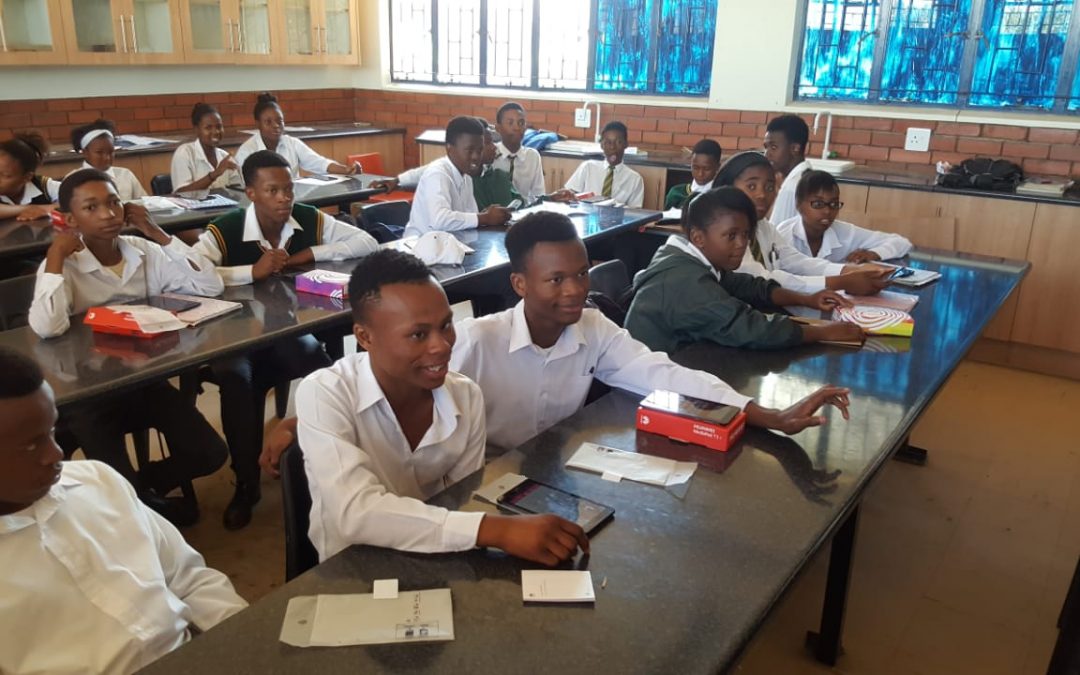
by Good News Lab | Jun 7, 2019 | Industry 4.0, Jendamark Junction
Thinking about the future – and the possibilities that technology can unlock – is integral to Jendamark’s business success. Which is why the Group has invested in innovative start-up Closed-Loop Learner Network (CLN).
While the Fourth Industrial Revolution holds the promise of rapid economic development for Africa, it cannot succeed when millions of children have no access to a decent education or online resources. This is the problem that CLN sets out to solve with its Omang digital device.
Meaning “identity” in Setswana, Omang aims to give under-privileged youngsters a digital identity. It is a tablet that is sponsored by various corporate partners and pre-loaded with connectivity, CAPS curriculum-approved textbooks, white-listed online resources, tutorials and exam papers for Grades 10 to 12 learners.
Omang has been piloted among a thousand children in no-fee schools in the Free State and, with the endorsement of the provincial education department, that number is expected to grow to 20,000 by the end of the 2019 academic year.
CLN’s stated ambition is to place a fully resourced tablet in the hands of one million of the poorest pupils within the next five years.
“There are at least eight million children in under-resourced schools who have no teacher to inspire them, no access to a bigger world, no hope that there is something for them beyond mere survival,” says Jendamark sales and design director Yanesh Naidoo.
“That’s the reason we first started looking into Omang, as a way to open up their worlds and their minds.”
South Africa currently ranks a paltry 54 out of 63 global economies in the category of education and training, according to the latest IMD World Digital Competitiveness Rankings.
Naidoo says Jendamark converged with the technology-driven CLN on a number of fronts, ultimately leading to a 41% stake in the social entrepreneurial start-up.
“We are excited about this long-term partnership and we’re bringing our Odin software platform into the mix, which will provide the API for third-party app development.”
Such apps, he explains, could be used to teach additional life skills, such as financial literacy, while creating branding and interaction opportunities for corporate sponsors.
CLN founder Ajit Gopalakrishnan says the goal is to become “the Facebook of education” and to collect data to gain in-depth insight into the next generation in order to equip them for the future.
“It’s about seeing the human potential – and the business opportunity – in including the masses in the economic equation,” he says.
For Jendamark managing director Quinton Uren, however, the mission is a lot more personal. As a historically disadvantaged person, he says he knows how important it is to give children the tools to explore and dream and to see beyond their limiting reality.
“What we’ve been searching for at Jendamark is how to give back effectively. When Ajit presented this programme, I just knew: this rang true. We can digitise and give millions of children hope. This can be a real game-changer.”
Uren says the aim is not to repair South Africa’s underperforming education system, but to leapfrog it.
“Industry 4.0 is the perfect platform to achieve this. With this paperless tablet device, we can really change lives and the future of our country.”





